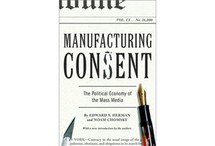Manufacturing Consent: The Political Economy of the Mass Media
By Edward S. Herman, Noam Chomsky
412 pages;
Pantheon
Noam Chomsky is one of the most widely read writers on American foreign policy in the world. I read Manufacturing Consent in high school and decided to do a report on it for my U.S. history class. The report was a disaster—it took me another 10 years to understand the book—but it provided a radical shift in my perception of how the world operated. Chomsky and Herman demonstrate that while we pride ourselves on a "free press," in truth we have a press that is actually quite self-censoring, and thus hardly free at all.
Most of the media, they explain, are big corporations subject to the same pressures of competition as other corporations, a hard economic fact that fatally undermines their ability either to report the news honestly or to comment on it fairly. Instead of aiming to tell the truth to the American people—so that responsible democratic decisions can be made—the big media are in business to sell audiences to advertisers and are far more concerned with pleasing their shareholders than with letting anything be said that may disrupt that process.
Although the First Amendment is on the books (and sadly, today it functions chiefly to be exploited by tabloid media), Chomsky, Herman, and many of the voices with dissenting views are never invited to appear on our TV screens, unless they can dance—or swap wives. As a result, despite the sanctimonious and self-satisfied chest-thumping of pundits and politicians about the "free press," our press remains narrowly restricted.
I'm grateful to the book for introducing me to Chomsky, a political analyst whose startling brilliance comes from speaking plainly and without compromise about matters that others would wrap in a mendacious fog. Along with Howard Zinn—whose book A People's History of the United States had a similar impact on my life—Chomsky is a writer I believe everyone should read. You will not agree with either of them all the time (I don't), but even when you disagree, you will find both men challenging your preconceptions, making you think, and generally leaving you smarter and more compassionate than when you found them.
— Ben Affleck


